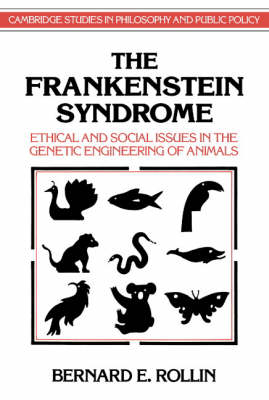
The Frankenstein Syndrome
Ethical and Social Issues in the Genetic Engineering of Animals
Seiten
1995
Cambridge University Press (Verlag)
978-0-521-47807-6 (ISBN)
Cambridge University Press (Verlag)
978-0-521-47807-6 (ISBN)
This book is a philosophically sophisticated and scientifically well-informed discussion of the moral and social issues raised by genetically engineering animals, a powerful technology which has major implications for society. Bernard Rollin is both a professor of philosophy, and physiology and biophysics, and writes from a uniquely well-informed perspective on this topic.
This book is a philosophically sophisticated and scientifically well-informed discussion of the moral and social issues raised by genetically engineering animals, a powerful technology which has major implications for society. Unlike other books on this emotionally charged subject, the author attempts to inform, not inflame, the reader about the real problems society must address in order to manage this technology. Bernard Rollin is both a professor of philosophy, and physiology and biophysics, and writes from a uniquely well-informed perspective on this topic. The style is non-technical and anecdotal and will ensure that the book can be used on a wide range of courses on bioethics, biotechnology, veterinary medicine and public policy. The book could also appeal to a general, non-academic reader with a serious interest in genetic engineering.
This book is a philosophically sophisticated and scientifically well-informed discussion of the moral and social issues raised by genetically engineering animals, a powerful technology which has major implications for society. Unlike other books on this emotionally charged subject, the author attempts to inform, not inflame, the reader about the real problems society must address in order to manage this technology. Bernard Rollin is both a professor of philosophy, and physiology and biophysics, and writes from a uniquely well-informed perspective on this topic. The style is non-technical and anecdotal and will ensure that the book can be used on a wide range of courses on bioethics, biotechnology, veterinary medicine and public policy. The book could also appeal to a general, non-academic reader with a serious interest in genetic engineering.
1. THere Are Certain Things Humans Were Not Meant to Do; 2. Rampaging monsters; 3. The plight of the creature.
| Erscheint lt. Verlag | 30.6.1995 |
|---|---|
| Reihe/Serie | Cambridge Studies in Philosophy and Public Policy |
| Zusatzinfo | 1 Tables, unspecified; 1 Line drawings, unspecified |
| Verlagsort | Cambridge |
| Sprache | englisch |
| Maße | 152 x 226 mm |
| Gewicht | 390 g |
| Themenwelt | Geisteswissenschaften ► Philosophie ► Ethik |
| Medizin / Pharmazie ► Medizinische Fachgebiete ► Medizinethik | |
| Studium ► Querschnittsbereiche ► Geschichte / Ethik der Medizin | |
| ISBN-10 | 0-521-47807-3 / 0521478073 |
| ISBN-13 | 978-0-521-47807-6 / 9780521478076 |
| Zustand | Neuware |
| Haben Sie eine Frage zum Produkt? |
Mehr entdecken
aus dem Bereich
aus dem Bereich
Die Geschichte eines Weltzentrums der Medizin von 1710 bis zur …
Buch | Softcover (2021)
Lehmanns Media (Verlag)
17,95 €
Krankheitslehren, Irrwege, Behandlungsformen
Buch | Softcover (2024)
C.H.Beck (Verlag)
39,95 €


